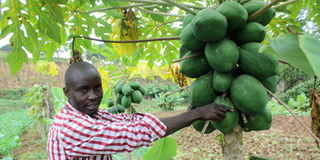Farmer wins Sh5m in lottery, eyes irrigation

Mathew Muli, a horticulture farmer in Machakos, who won in the Angukia Chapa lottery two weeks ago and plans to expand his agribusiness using the money. PHOTO | ANTHONY OMUYA | NATION MEDIA GROUP
What you need to know:
- For Muli and his wife Janet, they decided to venture into large-scale sukuma wiki farming as water was no longer a problem.
- To grow the crop, he first starts by planting seedlings in the nursery, where they stay for about a month before he transplants them to the main farm in spaces of 30cm from one crop and 60cm from one row to another.
- Muli is set to expand his farming business after winning Sh5 million in the Angukia Chapa lottery two weeks ago.
- Farmers should choose seeds that are high-yielding, resistant to diseases, hardy, suited to the ecological conditions in the specific area of production and varieties which are required by consumers in the market.
The day was chilly as we drove to Matakutha village in Tala, Machakos County to meet Mathew Muli, a horticulture farmer.
After about a 20km drive on a rough earthen road, we arrive on his farm.
Muli, a recent winner of Sh5 million windfall from a lottery, farms a number of crops but mainly bananas, sukuma wiki (collard greens), pawpaws and tomatoes. Occasionally, he grows maize and beans.
Sukuma wiki, however, is his main crop, which makes customers flock his two-acre farm every week.
“I have been farming the crop for the last five years. This is where I have been getting my daily bread and using the money to support my family,” says Muli, noting before he settled on sukuma wiki, he was a maize and beans farmer.
The switch to the popular vegetable followed the inauguration of a water project by the county government, with extension officers asking farmers to grow vegetables.
For Muli and his wife Janet, they decided to venture into large-scale sukuma wiki farming as water was no longer a problem.
“I grow the crop all-year-round and the good thing with sukuma wiki is that it takes a short time to mature. That means we are able to earn a living throughout,” says Muli, noting he invested into the project about Sh10,000 he saved from his previous farming activities.
He has been expanding the farm using the money he gets from the vegetable.
“I have partitioned the farm into sections where I plant at different times to ensure I harvest all-year-round.”
To grow the crop, he first starts by planting seedlings in the nursery, where they stay for about a month before he transplants them to the main farm in spaces of 30cm from one crop and 60cm from one row to another.
“I normally apply DAP fertiliser in every hole during planting and top-dress after two weeks and add manure when the leaves starts to fold,” he explains, adding animal manure helps to make the plant’s leaves sweet and soft.
He sprays the crops after every two weeks to prevent pests like Diamondback moth and cut worms and aphids and diseases like Black rot, Black leg, Club root and Damping off.
CHOOSE BEST QUALITY SEEDS
The plants must be watered twice a day to keep them healthy.
“The crop is ready for harvesting and sale in about a month. I harvest three times a week and sell to traders from Tala making a profit of at least Sh30,000 every month.”

Muli picks vegetables in his farm in Machakos. These vegetables are his main crop, which make customers flock his two-acre farm every week. PHOTO | ANTHONY OMUYA | NATION MEDIA GROUP
On the other hand, to plant banana plantlets, Muli with the help of his workers digs holes measuring three by three feet.
“We then mix two 10kg tins of cow manure with the top soil and put in the hole and add 200g of DAP fertiliser.”
The seedling is then planted carefully in the middle of the hole and watered thoroughly.
“When the water percolates into the ground, we mix a nematicide with water at a ratio of 1:1 and spray in the hole.
This is key in preventing diseases,” says Muli, adding the plants are watered with 20 litres of water twice per week.
Muli is set to expand his farming business after winning Sh5 million in the Angukia Chapa lottery two weeks ago.
“I will use the money to expand my agribusiness since this is where I got the money to play the lottery every day by sending an SMS to the given number. I will buy another piece of land and embrace irrigation. I now want to be a commercial farmer growing a variety of crops,” he says.
Carol Mutua from the Department of Crops, Horticulture and Soils Egerton University, says sukuma wiki stays in the field for long, therefore it needs more fertilisers with nitrogen.
“Excessive nitrogen application may however result in flash growth that is not able to withstand harsh conditions,” she says, adding the crop is shallow-rooted and care should be taken not to damage roots in the field during weeding as this would encourage entry of fungi and bacteria.
Farmers should choose seeds that are high-yielding, resistant to diseases, hardy, suited to the ecological conditions in the specific area of production and varieties which are required by consumers in the market.
***
Getting the best from bananas
For bananas, pruning is recommended to control pests like weevils, extend the life span of the orchard, improve yield performance and spread the yields.
Any excess and unwanted suckers should be removed from the main plant. Suckers should be removed in a circular fashion to restrict stool spreading.





